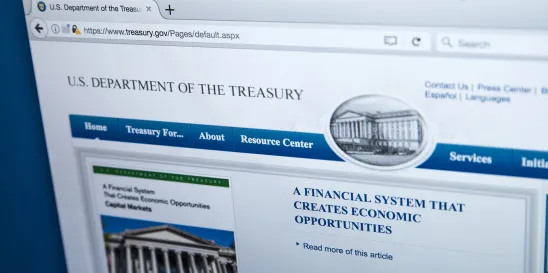On April 11, 2024, the Committee on Foreign Investment in the United States (CFIUS), a multi-agency committee administered by the U.S. Treasury Department, released a proposed rule (“Proposed Rule”) to amend the CFIUS regulations.[1] The Proposed Rule seeks “to enhance the Committee’s identification and resolution of national security risks” by expanding the scope of information that CFIUS can seek from parties and its ability to compel production of such information. As summarized below, the proposed authorities will bolster CFIUS’s ability to monitor and investigate non-notified transactions as well as potential violations of mitigation obligations, including by increasing financial penalty exposure to parties and streamlining CFIUS’s ability to issue subpoenas. Comments to the Proposed Rule will be due within 30 days of publication in the Federal Register, which is expected in the coming days.
1. Expanded categories of information that CFIUS may seek from parties to non-notified transactions
Section 721(b)(1)(H) of the Defense Production Act, as amended,[2] mandates CFIUS to develop a process to identify transactions that have not been filed with CFIUS (so called “non-notified” transactions). Current CFIUS regulations require parties to a non-notified transaction to provide information in response to a CFIUS request sufficient “to determine whether the transaction is a covered transaction . . .” (31 CFR § 800.501(b) and § 802.501(b) (emphasis added)). That is, CFIUS is limited to determining whether it has authority over the non-notified transaction.
The Proposed Rule expands the scope of what CFIUS may request, and seek a subpoena to obtain, from parties to non-notified transactions to include information about “national security considerations” and “the criteria for a mandatory” filing requirements. Thus, in addition to confirming whether CFIUS has authority (i.e., whether a non-notified transaction is a “covered transaction”), the Proposed Rule will expand the scope of what information CFIUS may obtain from parties to any non-notified covered transaction to include substantive information related to national security and mandatory filing assessments, which essentially would cover any information that would be part of a CFIUS filing or review. The stated rationale for this expanded scope would be to allow CFIUS “to prioritize” non-notified transactions that raise concerns or for which the parties failed to submit a mandatory filing. It is not intended to be “a substitute for a review or an investigation . . .” CFIUS is already requesting this information as relevant, but these amendments will require parties to respond and provide CFIUS with the authority to compel responses.
2. CFIUS may request information from parties relating to mitigation compliance and prior misstatements/omissions during earlier cases
In addition to CFIUS requests relating to non-notified transactions, the Proposed Rule will require parties to prior CFIUS filings to comply with requests concerning (1) compliance with mitigation agreements, conditions imposed, or orders, and (2) whether parties made any material misstatements or omissions during a concluded review or investigation. CFIUS will also be able to seek this information using the subpoena authority of the Defense Production Act. Again, CFIUS already requests this information when relevant, but these amendments require parties to respond.
3. Expands CFIUS’s ability to obtain subpoenas
To facilitate execution of these expanded investigatory authorities, and also facilitate existing information collection powers, the Proposed Rule expands the ability of CFIUS to obtain a subpoena. Currently, CFIUS may seek a subpoena “[i]f deemed necessary,” (31 CFR 800.801(a) and 802.801(a)), but the Proposed Rule amends this to a broader “if deemed appropriate” standard and vests the authority to issue subpoenas in the CFIUS Staff Chairperson. The new standard and the Chairperson’s subpoena authority will greatly expand CFIUS’s ability to compel information.
4. Requirement to respond to proposed mitigation terms within three business days.
As parties that have previously been before CFIUS may know, the regulations impose strict timelines on parties to respond to CFIUS information requests during a pending review or investigation (responses are required within two business days for declaration filings and three business days for notice filings, with limited ability to obtain extensions). However, current regulations do not provide a timeline for which parties must respond to draft mitigation terms being negotiated with CFIUS. Treasury’s comments to the Proposed Rule explain that the lack of timing requirements on parties to address mitigation terms can result in a protracted process, “particularly . . . with regard to reviews of closed transactions.”
The Proposed Rule imposes a “three business day period for substantive party responses to proposed mitigation terms,” unless an extension is granted by CFIUS. Failure to meet the deadline gives CFIUS the authority to reject the filing. “The Committee expects a substantive response to consist of acceptance of the terms, a counterproposal, or a detailed statement of reasons that the party or parties cannot comply with the proposed terms, which may also include a counterproposal.” The comments to the Proposed Rule provide that reasons for an extension include the receipt of an initial mitigation proposal or a complex proposed mitigation.
5. Penalty amount increased from $250,000 to $5,000,000 in regulations
Section 721 gives CFIUS the authority to impose “civil penalties for any violation” of Section 721. The following chart summarizes the current penalties associated with each potential violation and those under the Proposed Rule. CFIUS has discretion in the ultimate penalty issued and “the maximum would not necessarily be imposed, but may be appropriate depending on the facts and circumstances” consistent with CFIUS’s Enforcement and Penalty Guidelines. The new penalties would apply to violations on or after the effective date of the final rule. However, with respect to violations of a mitigation agreement, condition imposed, or order from CFIUS, the new penalties would apply to only those having “mitigation agreements entered into, conditions imposed, and orders issued on or after the effective date of the final rule making the amendments.”
| Violation | Current Penalty (§800.901, §800.901) | Proposed Penalty |
| Submitting a filing with a material misstatement or omission, or making a false certification to a filing (i.e., certifications attesting to the accuracy of information provided during a review) | Not to exceed $250,000 per violation | Not to exceed $5,000,000 per violation |
| Failing to submit a timely mandatory filing | Not to exceed the greater of $250,000 or the value of the transaction, per violation | Not to exceed the greater of $5,000,000 or the value of the transaction, per violation |
| Violating a material provision of a mitigation agreement, condition imposed, or order | Not to exceed the greater of $250,000 or the value of the transaction, per violation | Per violation, not to exceed the greater of: $5,000,000; the value of the transaction; the value of the party’s interest in the U.S. business at the time of the transaction; orthe value of the party’s interest in the U.S. business at the time of the violation. |
| Providing material misstatement or omission in response to CFIUS requests outside of the filing process (e.g., CFIUS requests for information to parties concerning non-notified transactions, failure to file, or for monitoring mitigation compliance) | Not covered. | Not to exceed $5,000,000 per violation |
[1] Amendments to Penalty Provisions, Provision of Information, Negotiation of Mitigation Agreements, and Other Procedures Pertaining to Certain Investments in the United States by Foreign Persons and Certain Transactions by Foreign Persons Involving Real Estate in the United States (April 11, 2024) (pending publication in the Federal Register), available online here.
[2] Section 721 of the Defense Production Act of 1950, as amended by the Foreign Investment Risk Review Modernization Act of 2018 (FIRRMA), which became effective August 13, 2018.




 />i
/>i
